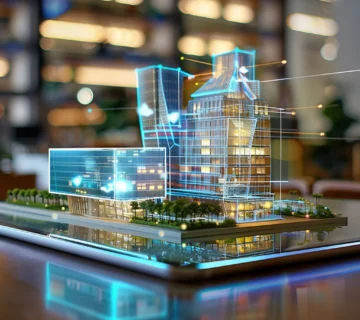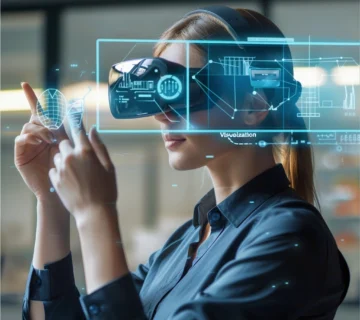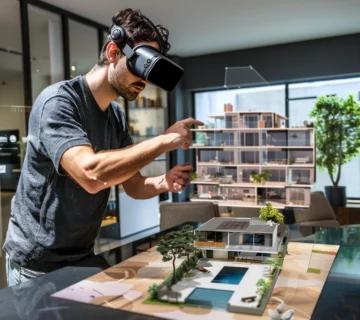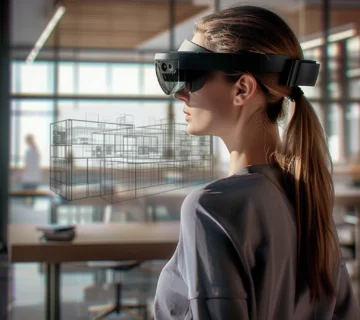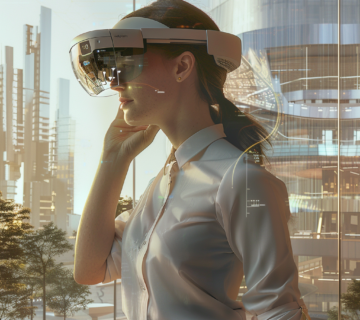AR Marketing Campaigns Revolutionize Your Outreach, Unlocking Success in real-estate marketing
AR Marketing Campaigns Revolutionize
Introduction:
In the fiercely competitive realm of real estate, the ability to capture atte0ntion and engage prospective buyers is a constant challenge. Traditional marketing methods, while effective in their own right, often struggle to convey the full potential and allure of a property. However, amidst this landscape of opportunity and challenge emerges a revolutionary solution: Augmented Reality (AR) marketing campaigns. By seamlessly blending the virtual world with reality, AR campaigns have emerged as a transformative tool, offering real estate professionals unparalleled opportunities to redefine their outreach strategies and unlock unprecedented success.
AR Marketing Campaigns, leveraging cutting-edge technology, offer an immersive experience that transcends the limitations of traditional marketing approaches. Through the lens of AR, potential buyers can virtually step into properties, exploring every corner, detail, and possibility. This level of interactivity not only captures attention but also ensures that the full potential and allure of a property are vividly communicated, fostering a deeper connection with prospective buyers.
Moreover, AR Marketing Campaigns break geographical barriers, enabling potential buyers to explore properties remotely. Whether they are across town or across the globe, individuals can virtually tour properties, experiencing them as if they were physically present. This accessibility broadens the reach of marketing efforts, tapping into previously untapped markets and expanding the pool of potential buyers.
In addition to enhancing engagement and accessibility, AR Marketing Campaigns offer unparalleled opportunities for personalization and customization. By tailoring experiences to the preferences and interests of individual buyers, real estate professionals can deliver targeted content that resonates on a personal level. Whether it’s showcasing design options, highlighting amenities, or providing insights into the surrounding neighborhood, AR allows for a tailored experience that speaks directly to the needs and desires of each prospective buyer.
Furthermore, the data-driven nature of AR Marketing Campaigns provides invaluable insights for continuous optimization. By analyzing user interactions, preferences, and engagement levels, real estate professionals can refine their strategies, ensuring that each campaign is as effective as possible. This iterative approach not only maximizes the impact of current campaigns but also informs future marketing efforts, driving ongoing success in an ever-evolving market landscape.
Immersive Experiences: Augmented Reality Redefining Real Estate Marketing:
The Power of Augmented Reality in Real Estate Marketing:
Augmented Reality (AR) marketing campaigns have revolutionized the way properties are presented to potential buyers and investors. Unlike traditional methods that rely on static images and descriptions, AR empowers marketers to create immersive experiences that resonate deeply with their audience.
With AR technology, prospects can now go beyond merely viewing images of properties; they can virtually step inside and explore every detail in stunning three-dimensional detail. Through interactive features, such as virtual tours and customization options, individuals can visualize themselves living or working in the space, making informed decisions based on their preferences and needs.
The convenience of accessing these experiences from smartphones or tablets further enhances engagement, allowing prospects to explore properties anytime, anywhere. This accessibility not only caters to the fast-paced nature of modern life but also ensures that potential buyers remain deeply engaged throughout their journey.
Moreover, the immersive nature of AR experiences fosters a deeper emotional connection between prospects and properties. By allowing individuals to envision themselves in the space and interact with it on a personal level, AR marketing campaigns evoke feelings of ownership and attachment, leading to increased interest and ultimately, higher conversion rates.
In essence, AR Marketing Campaigns in real estate transcend traditional boundaries, offering a dynamic and interactive platform for showcasing properties. Through immersive experiences, AR not only captures attention but also fosters genuine connections, redefining how properties are marketed and sold in the digital age.
Breaking Boundaries: AR Marketing Campaigns Revolutionize Real Estate Reach
Overcoming Limitations and Expanding Reach:
One of the most significant advantages of AR marketing campaigns lies in their ability to transcend the constraints of traditional marketing mediums. With AR, physical distance ceases to be a barrier. Prospects are empowered to explore properties remotely, irrespective of their geographical location, thereby obviating the need for in-person visits and vastly expanding the reach of marketing endeavors. This accessibility not only yields savings in time and resources but also unlocks access to a global audience, penetrating markets that were previously beyond reach.
AR Marketing Campaigns enable potential buyers to engage with properties from the comfort of their own homes, eliminating the need for costly and time-consuming site visits. Through immersive experiences facilitated by AR technology, individuals can conduct virtual tours, examine property details, and even visualize customization options without ever leaving their living rooms. This convenience not only streamlines the property search process but also ensures that prospects remain deeply engaged, leading to higher conversion rates and accelerated sales cycles.
Moreover, the ability to explore properties remotely via AR Marketing Campaigns opens doors to previously untapped markets. By removing geographical barriers, real estate professionals can effectively target and engage with potential buyers across diverse regions and demographics. Whether they’re halfway across the globe or just down the street, individuals can access and interact with properties, thereby broadening the pool of potential buyers and driving increased demand.
In essence, AR Marketing Campaigns serve as a transformative tool in real estate marketing, transcending the limitations of traditional approaches. By enabling remote exploration of properties and tapping into global audiences, AR not only enhances accessibility but also amplifies the effectiveness of marketing efforts. As real estate professionals embrace the potential of AR technology, they stand poised to revolutionize their reach and redefine the way properties are marketed and sold in the digital age.
Tailored Experiences: Personalized Engagement with AR Marketing Campaigns
Personalization and Targeted Content Delivery:
AR marketing campaigns elevate the level of personalization in real estate marketing to unprecedented heights. Through the integration of AR technology, marketers gain the ability to deliver highly targeted content that caters to the unique needs and preferences of each prospect. This level of customization extends beyond generic marketing messages, allowing for a tailored experience that resonates deeply with individual demographics, interests, and buying behaviors.
With AR technology, real estate professionals can craft immersive experiences that speak directly to the desires of potential buyers. Whether it’s showcasing different interior design options, highlighting key property features, or providing insights into the surrounding neighborhood, AR enables marketers to curate content that is relevant and compelling to each prospect. By presenting information in a manner that aligns with the specific interests and preferences of the viewer, AR campaigns foster a sense of connection and engagement that is unparalleled in traditional marketing approaches.
Furthermore, the personalization offered by AR extends beyond just visual content. Marketers can leverage AR technology to deliver interactive experiences that allow prospects to actively engage with the property in meaningful ways. For example, individuals may have the opportunity to virtually customize aspects of the property, such as selecting paint colors or arranging furniture, thereby empowering them to visualize themselves in the space and make more informed purchasing decisions.
The tailored nature of AR not only enhances engagement but also fosters trust and credibility with potential buyers. By demonstrating an understanding of their unique preferences and needs, marketers can establish a deeper connection with prospects, positioning themselves as trusted advisors in the home-buying process. This personalized approach not only increases the likelihood of conversion but also lays the foundation for long-term customer relationships and referrals.
In summary, AR Marketing Campaigns offer a level of personalization and targeted content delivery that is unmatched by traditional marketing methods. By leveraging AR technology to tailor experiences to the individual preferences of each prospect, marketers can drive engagement, build trust, and ultimately, achieve greater success in real estate marketing endeavors.
Maximizing Efficiency: Harnessing Data-Driven Insights with AR Marketing Campaigns
Data-Driven Insights for Continuous Optimization:
Moreover, AR marketing campaigns provide invaluable insights and data for real estate professionals. Through analytics and tracking capabilities, marketers can gain valuable feedback on user interactions, preferences, and engagement levels. This data-driven approach not only informs ongoing marketing strategies but also enables continuous optimization, ensuring that campaigns remain relevant and effective in an ever-evolving market landscape.
AR Marketing Campaigns serve as a goldmine of actionable data for real estate professionals. By leveraging advanced analytics and tracking tools, marketers can delve deep into user behavior and preferences, gaining valuable insights into how prospects interact with AR experiences. From the duration of virtual property tours to the specific features and options explored by users, every interaction provides valuable data points that can inform future marketing strategies.
This data-driven approach allows marketers to make informed decisions about content creation, audience targeting, and campaign optimization. By analyzing user engagement levels, marketers can identify trends and patterns, allowing them to tailor AR experiences to better meet the needs and preferences of their target audience. This iterative process of optimization ensures that AR Marketing Campaigns evolve in line with shifting market dynamics, maximizing their effectiveness over time.
Furthermore, the insights gleaned from AR Marketing Campaigns go beyond just informing individual campaigns; they also contribute to broader strategic planning efforts. By understanding which aspects of their AR experiences resonate most with users, marketers can refine their overall brand messaging and positioning, ensuring consistency across all marketing channels. This holistic approach to data-driven optimization enables real estate professionals to stay ahead of the curve in a rapidly changing market landscape.
In essence, AR Marketing Campaigns represent not only a powerful tool for engaging prospects but also a valuable source of data-driven insights for continuous optimization. By harnessing the wealth of data generated by AR experiences, marketers can refine their strategies, enhance user engagement, and ultimately, achieve greater success in their real estate marketing endeavors.
Unlocking Value: The Cost-Effectiveness of AR Marketing Campaigns
Cost-Effectiveness and ROI:
“Augmented reality offers a great way for brands and companies to create enaging marketing experiences for advertising campaings. In this overview you’ll find plenty inspring AR advertising examples for your next campaign.”[vrowl]
Furthermore, AR marketing campaigns have proven to be highly cost-effective in comparison to traditional marketing methods. While print materials and physical staging incur significant expenses, AR technology offers a more affordable alternative with limitless creative possibilities. By investing in AR, real estate professionals can achieve greater returns on their marketing investments while staying ahead of competitors still reliant on outdated approaches.
AR Marketing Campaigns offer a cost-effective solution for real estate professionals looking to maximize their return on investment. Unlike traditional marketing methods that require printing costs, distribution expenses, and potentially costly physical staging, AR campaigns can be implemented at a fraction of the cost. With the proliferation of smartphones and tablets, the accessibility of AR technology further reduces the need for expensive hardware investments, making it an attractive option for marketers operating on tight budgets.
Moreover, the cost-effectiveness of AR extends beyond just the initial implementation phase. Traditional marketing materials such as brochures and flyers often incur recurring costs for updates and reprints. In contrast, AR experiences can be easily updated and modified in real-time, allowing marketers to adapt to changing market conditions and consumer preferences without incurring additional expenses.
Additionally, the creative possibilities offered by AR technology enable marketers to achieve greater impact with fewer resources. From virtual property tours to interactive features showcasing different design options, AR allows for immersive experiences that captivate and engage audiences without the need for costly physical staging. This flexibility not only saves money but also enables marketers to experiment with innovative approaches to real estate marketing, driving greater ROI in the process.
In essence, AR Marketing Campaigns offer real estate professionals a cost-effective alternative to traditional marketing methods. By leveraging AR technology, marketers can achieve greater returns on their investments while unlocking limitless creative possibilities. As the real estate industry continues to evolve, embracing AR represents not only a smart financial decision but also a strategic move towards staying competitive in a rapidly changing market landscape.



Conclusion:
In conclusion, Augmented Reality (AR) marketing campaigns stand as a transformative force in the realm of real estate marketing, offering unparalleled opportunities for success in an increasingly competitive landscape. By harnessing the power of AR technology, real estate professionals can revolutionize the way properties are presented and experienced by prospective buyers.
One of the key advantages of AR marketing campaigns is their ability to create immersive experiences that transcend the limitations of traditional marketing methods. Through AR, potential buyers can virtually explore properties in stunning detail, gaining a deeper understanding and appreciation of their features and amenities. This immersive experience not only captures attention but also fosters a stronger emotional connection, leading to increased interest and engagement.
Moreover, AR marketing campaigns break down geographical barriers, allowing potential buyers to explore properties remotely from anywhere in the world. This accessibility expands the reach of marketing efforts, tapping into previously untapped markets and broadening the pool of potential buyers.
Additionally, AR technology enables real estate professionals to deliver personalized content tailored to the individual preferences and interests of each prospect. By presenting relevant information in a highly engaging and interactive format, AR campaigns can effectively cater to the unique needs of diverse demographics, driving greater engagement and ultimately, higher conversion rates.
Furthermore, AR marketing campaigns provide valuable insights into customer behavior through analytics and tracking capabilities. By analyzing user interactions, preferences, and engagement levels, real estate professionals can refine their strategies and optimize future marketing efforts, ensuring continued success in an ever-evolving market landscape.
In today’s competitive real estate market, embracing AR is not just an option; it’s a necessity for those looking to thrive and stay ahead of the curve. As the industry continues to evolve, AR remains a beacon of innovation, reshaping the way properties are marketed and sold in the digital age. By leveraging AR technology, real estate professionals can unlock new opportunities, engage buyers in meaningful ways, and drive success in their marketing endeavors.



